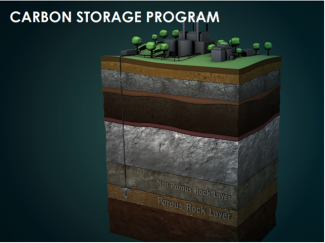A team of NETL researchers led by environmental sustainability expert Mark McKoy participated in the Carbon, Capture, Utilization, and Storage (CCUS) conference April 25–27 at the University of Houston in Texas.
McKoy and a team of experts addressed the Laboratory’s key research on point source carbon capture, CO2 removal, CO2 conversion into products, reliable CO2 storage, blue hydrogen production, and critical mineral production from industrial and mining waste.
The theme of the event was "An Emerging Field for Energy Professionals," and it brought together key decisionmakers and researchers from the American Association of Petroleum Geologists, the Society of Petroleum Engineers, and the Society of Exploration Geophysicists to address challenges related to:
- Subsurface Geologic Storage
- CO2 Enhanced Hydrocarbon Recovery
- Reservoir Monitoring and Risk Assessment
- Case Studies
- Industry Applications
- Economics, Incentives, and Policy
- Infrastructure
The work presented at the event demonstrated the ongoing need for skilled petroleum geologists, geophysicists, and engineers to help define the future of carbon management.
NETL’s Carbon Management Program, composed of a world-class team of high-performing leaders, scientists and engineers, possesses the engineering and scientific expertise to manage external research and development projects that further the U.S. Department of Energy (DOE) Fossil Energy and Carbon Management (FECM) program’s goals.
McKoy provided conference attendees with details about the Laboratory’s work on CCUS topics including: 21st Century power plants, transformational power generation, advanced combustion and gasification, solid oxide fuel cells, advanced turbines and carbon ore processing.
John Litynski of DOE’s Office of Fossil Energy and Carbon Management (FECM) was a keynote speaker.
According to the event sponsors “The maturing carbon market is a major driver for deployment CCUS projects. Both the subsurface technical knowledge and related data sets of the petroleum industry are major inputs required for the world to successfully move towards a carbon-neutral and sustainable energy future. CCUS has experienced growing interest over the past two decades, due to the desire to reduce CO2 emissions and to make industrial sources more environmentally sustainable.”
Program topics in which DOE/NETL personnel presented included:
-
DOE Technology R&D for a Gigaton Carbon Storage Industry — McKoy and Litynski.
-
Carbon Storage Assurance Facility Enterprise (CarbonSAFE): Developing Storage Infrastructure for Future Carbon Capture Sources —Traci Rodosta.
-
Machine Learning Based Fast Models for Prediction of CO2 Plume and Pressure Buildup in Geological CO2 Storage — Jared Schuetter.
-
The SMART Initiative: Utilization of Machine Learning to Assist Virtual Learning During Permitting and Real-Time Operational Decision Making for CCUS Projects — Hema Siriwardane and Grant Bromhal.
-
Comparative Economic Analysis of Capture, Transport, and Storage from a CO2 Source Perspective — Allison Guinan, Alana Sheriff and Tim. Grant.
-
U.S. Department of Energy Strategic Planning and R&D Priorities for National-Scale CO2 Transport — Kevin Dooley.
-
Techno-Economic Models are Instrumental and Analyzing Decarbonization Strategies — Guinan, Sheriff, David Morgan, Grant, Travis Warner, Kolawole Bellow, Derek Vikara, Nur Wijaya, and Luciane Cunha.
-
Caprock Wettability Under CO2 Geostorage Conditions — Dustin Crandall and Angela Goodman.
-
Comparative Study of Commercial-Scale CO2 Storage Options in Single and Stacked Saline Formations in Managing Reservoir Pressure Buildup — Wijaya, Morgan, Vikara, Grant and Cunha.
-
Pathways to CO2 Utilization and Storage for the Intermountain West — Vikara, John Eppink, Raymond T. Vactor, Warner, Scott Matthews, Morgan, Guinan, Michael Marquis, and Cunha.
NETL is a DOE national laboratory that drives innovation and delivers technological solutions for an environmentally sustainable and prosperous energy future. By using its world-class talent and research facilities, NETL is ensuring affordable, abundant and reliable energy that drives a robust economy and national security, while developing technologies to manage carbon across the full life cycle, enabling environmental sustainability for all Americans.




